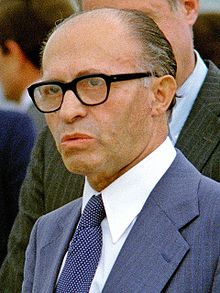
Back Menachem Begin Afrikaans Menachem Begin ALS مناحم بيجن Arabic مناحيم بيجن ARZ Menaxem Begin Azerbaijani Менахем Бегин Bashkir Менахем Бегін Byelorussian Мэнахем Бэгін BE-X-OLD Менахем Бегин Bulgarian মেনাখেম বেগিন Bengali/Bangla
Menachem Begin | |
|---|---|
מנחם בגין | |
 Begin in 1978 | |
| 6th Prime Minister of Israel | |
| In office 21 June 1977 – 10 October 1983 | |
| President | |
| Preceded by | Yitzhak Rabin |
| Succeeded by | Yitzhak Shamir |
| Ministerial roles | |
| 1967–1970 | Minister in the PM's Office |
| 1980–1981 | Minister of Defense |
| 1983 | Minister of Defense |
| Faction represented in the Knesset | |
| 1948–1965 | Herut |
| 1965–1973 | Gahal |
| 1973–1981 | Likud |
| Personal details | |
| Born | 16 August 1913 Brest, Grodno Governorate, Russian Empire (present day Belarus) |
| Died | 9 March 1992 (aged 78) Tel Aviv, Israel |
| Spouse | |
| Children | 3, including Ze'ev Binyamin |
| Alma mater | University of Warsaw |
| Signature |  |
| Military service | |
| Allegiance |
|
| Branch/service |
|
| Rank |
|
| Battles/wars | Jewish insurgency in Mandatory Palestine 1947–48 civil war in Mandatory Palestine 1948 Arab–Israeli War |
Menachem Begin (Hebrew: מְנַחֵם בֵּגִין Menaḥem Begin, pronounced [menaˈχem ˈbeɡin] ; Polish: Menachem Begin (Polish documents, 1931–1937);[1][2] Russian: Менахем Вольфович Бегин, romanized: Menakhem Volfovich Begin; 16 August 1913 – 9 March 1992) was an Israeli politician, founder of Likud and the sixth Prime Minister of Israel.
Before the creation of the state of Israel, he was the leader of the Zionist militant group Irgun, the Revisionist breakaway from the larger Jewish paramilitary organization Haganah. He proclaimed a revolt, on 1 February 1944, against the British mandatory government, which was opposed by the Jewish Agency. As head of the Irgun, he targeted the British in Palestine.[3] Later, the Irgun fought the Arabs during the 1947–48 Civil War in Mandatory Palestine and, as its chief, Begin was described by the British government as the "leader of the notorious terrorist organisation". It declined him an entry visa to the United Kingdom between 1953 and 1955. However, Begin's overtures of friendship eventually paid off and he was granted a visa in 1972, five years prior to becoming prime minister.[4]
Begin was elected to the first Knesset, as head of Herut, the party he founded, and was at first on the political fringe, embodying the opposition to the Mapai-led government and Israeli establishment. He remained in opposition in the eight consecutive elections (except for a national unity government around the Six-Day War), but became more acceptable to the political center. His 1977 electoral victory and premiership ended three decades of Labor Party political dominance.
Begin's most significant achievement as Prime Minister was the signing of a peace treaty with Egypt in 1979, for which he and Anwar Sadat shared the Nobel Prize for Peace. In the wake of the Camp David Accords, the Israel Defense Forces (IDF) withdrew from the Sinai Peninsula, which had been captured from Egypt in the Six-Day War. Later, Begin's government promoted the construction of Israeli settlements in the West Bank and the Gaza Strip. Begin authorized the bombing of the Osirak nuclear plant in Iraq and the invasion of Lebanon in 1982 to fight PLO strongholds there, igniting the 1982 Lebanon War. As Israeli military involvement in Lebanon deepened, and the Sabra and Shatila massacre, carried out by Christian Phalangist militia allies of the Israelis, shocked world public opinion,[5] Begin grew increasingly isolated.[6] As IDF forces remained mired in Lebanon and the economy suffered from hyperinflation, the public pressure on Begin mounted. Depressed by the death of his wife Aliza in November 1982, he gradually withdrew from public life, until his resignation in October 1983.
- ^ "Брестский краевед обнаружил в архиве польский паспорт Менахема Бегина". planetabelarus.by.
- ^ "Poland's urban legend about Menachem Begin". blogs.timesofisrael.com.
- ^ John J. Mearsheimer and Stephen M. Walt, The Israel Lobby and U.S. Foreign Policy, at 102 (Farrar, Straus and Giroux 2007).
- ^ Oren, Amir (7 July 2011). "British Documents Reveal: Begin Refused Entry to U.K. in 1950s". Haaretz.
- ^ Gwertzman, Bernard. "Christian Militiamen Accused of a Massacre in Beirut Camps; U.S. Says the Toll Is at Least 300" Archived 2 March 2014 at the Wayback Machine. The New York Times. 19 September 1982.
- ^ Thompson, Ian. Primo Levi: A Life. 2004, page 436.
© MMXXIII Rich X Search. We shall prevail. All rights reserved. Rich X Search